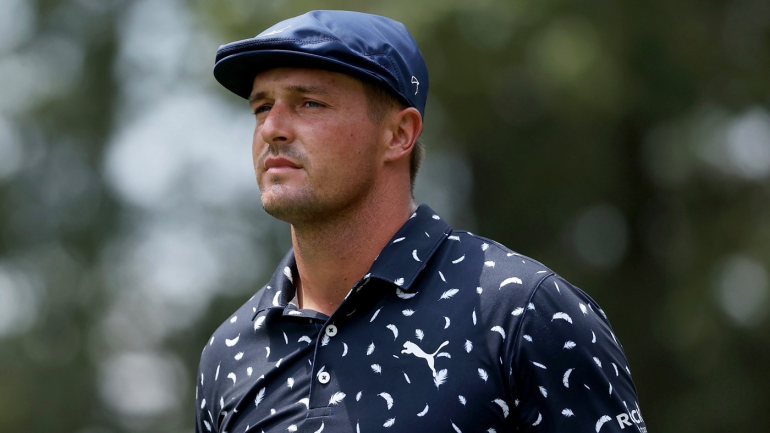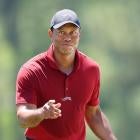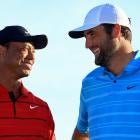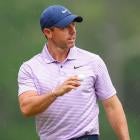
Humility and professional sports are seemingly incongruent. This is especially true when it comes to golf. The arrogance necessary to truly believe that you are indeed better than the other 155 elite golfers in any given field does not mesh well with the humility often required to be beloved in the public eye.
Bryson DeChambeau has had a weird summer. Since finishing T3 at the Players Championship in March, he has just two other top 10s on his resume. One came at the Wells Fargo Championship in May after he thought he missed the cut on Friday, flew home and had to fly back in the middle of the night for a Saturday tee time. The other came on Sunday at the WGC-FedEx St. Jude Invitational where he shot 6 over on the back nine on Sunday to miss out on a playoff by four.
Another instance of contending came at the 2021 U.S. Open at Torrey Pines. DeChambeau was in the lead halfway through his final round before firing a 44 (!!) on the back nine to finish outside the top 25 even after he led the golf tournament with just nine holes to go! These last two ejections mark two of his three worst final-round performances when entering the final round inside the top five on the leaderboard.
DeChambeau has entered a final round inside the top five exactly 24 times as a professional, and according to Data Golf, he has only lost strokes to the field in six of them. Nine times he's gained three or more strokes against the field (this is a lot!), and overall he has increased his already-good odds of winning -- independent of how other golfers performed -- in 11 of those 24 rounds. In other words, he's been a fantastic closer. John Ezekowitz laid this out in an article at the beginning of 2021 showing that DeChambeau and Brooks Koepka were the two best at closing over the last five years when in contention. This has been an underrated part of DeChambeau's arsenal to this point.
Speaking of DeChambeau and Koepka … the through line of 2021 for the former has been his melodramatic feud with the latter. It has been talked about (unflatteringly) more than anything else he has done, either on or off the course.
This is a problem for DeChambeau. The reality here is that, conceptually anyway, DeChambeau should be a hero. He's the longest player in the world. He completely reinvented himself when he was already one of the 10 best players in the world. He has, in small (and maybe big) ways, changed the sport, and has been properly lauded for the risks he's taken. There are some real Steph Curry parallels in there if you look closely enough. It's the entrepreneurial stuff of which American dreams are made. He should be his own "How I Built This" episode, and yet, it has gone pretty far the other way for him. If he's not reviled, he's adjacent to it.
This would be fine if he was a willing antihero. But DeChambeau, like pretty much everyone in the world, is desperate to be beloved to the point that it is affecting his scorecard. This is the intersection of psychoanalysis and actual on-course play. I don't think it's coincidental that two of his three biggest meltdowns have happened this summer in the wake the digital brouhaha with Koepka. When he gets going the wrong direction, like he did on Sunday with a bogey-triple start to the second nine, you can almost see him get wild-eyed as galleries chant Koepka's name at him. DeChambeau thought winning (specifically winning the U.S. Open) would take care of everything, but that apparently doesn't apply to everyone, and that realization has made everything even more difficult.
As Shane Ryan pointed out on Sunday, this is sad and has taken on a life of its own in his struggles, but it's also at least partially his fault. For years, DeChambeau has insinuated that he and the rest of the golf world are not on the same intellectual plane. He has very little self-awareness about what he's saying and how it comes across. It should be no surprise when this is absorbed by fans and delivered back to him on these weekends. When you sow self-aggrandizement, you will, in failure, reap the indignation of others. Koepka simply gave everyone the justification they needed to pile on.
In an effort to maintain the facade of genius, DeChambeau is seemingly unwilling to accept responsibility for anything that doesn't break his way and fearful of revealing his own humanity. He only ever receives the worst luck; on his 44 at the U.S. Open, DeChambeau said, "Unfortunately, had bad break after bad break happen." A level of self-delusion is necessary for every professional golfer to maintain a baseline of success, but DeChambeau outpaces what is required to the point that other top pros seem meek by comparison. Forget golf -- everyone knows this person in real life, and this person is extraordinarily difficult to pull for.
Even a drop of humility would permeate every corner of the narrative. If it has existed, it's been scant. An "I probably didn't treat my caddie like I should have" or a"You know what, it's not my driver's fault, I'm the one who sucked." This would be meaningful! He can turn the tide on himself, but I'm not sure he will. This should not be surprising either. We're talking about someone who once threw his name into a group of world-changers that included George Washington and Albert Einstein. Humility is not rampant among many 27-year-olds (myself included), even less so world-class athletes.
Two moments (among many) stick out this summer. The first came at The Memorial when he allegedly started having fans ejected for calling him "Brooksie." Here's what he said:
"Oh, they weren't taunts at all, it was flattering," said DeChambeau. "I think it's absolutely flattering what they're doing. They can keep calling me that all day if they want to, I've got no issue with it. When you look at it, there's obviously a distraction -- to most people they think it's a distraction, but I grew up learning how to deal with that stuff and I honestly thought it was flattering."
It doesn't take humility to deny what is so obvious. It takes a lot to admit it.
The other quote came after DeChambeau's 44 on the back nine at Torrey. A complete meltdown that included an 8 on the 17th hole. He was trying to win back-to-back U.S. Opens.
"[I'm over it] right now," he said. "I don't even care. I've changed a lot, attitude-wise and everything. It's frustrating in the moment when it's happening, but afterwards for me now, I don't really care as much. I've already won it."
Caring about something implies vulnerability, and vulnerability requires humility. But why does it matter that somebody like DeChambeau displays humility? Why does he owe that to us? The truth is that he doesn't. However, if swelling disdain among galleries is legitimately affecting his on-course play like it seems that it is, then he suddenly has an actual occupational problem. What people think about you doesn't matter until you allow it to matter. Then it matters a lot, especially in the mental minefield of professional golf.
There are innumerable ways to explain DeChambeau's summer, and this is one of many variables. It does not mean he's never going to win again. It doesn't even mean he's not going to win again this year. For him, though, it's worth considering. I don't know if humility would make Bryson DeChambeau a better golfer, though I suspect it might make him a smarter one, but I do know it would make him easier to root for, which is both what he needs to play better and what he's really wanted all along.





















